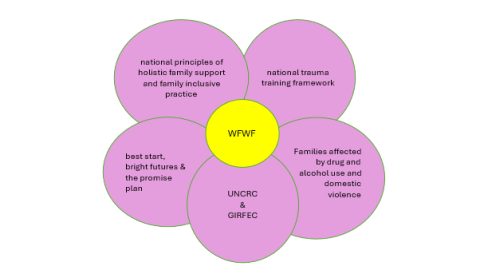The Whole Family Wellbeing Fund is primarily focused on supporting operational and revenue costs, volunteer and one-off fixed term staff costs, expenses, equipment, and so on to fulfil the activity.
This fund allocation is being distributed over two years (April 2025 to April 2027).
Funding limits
Small grant funding (distributed by Voluntary Action Angus) = maximum £25,000 per grant application. Only voluntary sector can apply.
Larger grant funding (distributed by Angus Council) = £50,000 per application, with an option to apply for a one-off payment of up to £20,000 to help with start-up costs.
The WFW Fund will end on 31 March 2027.
Bidding criteria
The Whole Family Wellbeing Fund has been established to support transformative and systemic change.
The following criteria applies to both third sector and statutory services.
The criteria sets out the broad parameters for how funding should be allocated to community organisations. However, this is intended to be flexible to allow local partnership groups to identify their own priorities for spend within the terms of the fund criteria.
Where allocations are used to scale up existing transformational activity, the funding must only be used to fund the scaled element of the approach, with a view to attaining a sustainable service.
The funding must not be used to support business as usual or be used to replace funding already in the system for providing support to families. Rather, the funding must be used as additional resource to support transformation of the system in line with the National Principles for Holistic Family Support and the ambition set out to #KeepThePromise. See Angus Promise Plan 2024/27 and Promise Progress Report
Funding cannot be used to supplement or sustain existing services.
Applications are open to:
voluntary or community organisations
registered charities
groups or clubs
not-for-profit companies
Community Interest Companies
Community Councils
statutory services
All applications must evidence a new systems approach that works towards building transformational capacity and/or scaling up existing services within AICSPP.
This fund cannot be used to replace funding, which is already, or should be, funded by statutory services. All applications must be new innovations.
In addition:
The activity supported by the fund must incorporate effective and formative learning and evaluation which supports national learning and improvement.
Funded activity must be able to demonstrate intended impact on the wellbeing of children and families.
Planned spending must undergo relevant impact assessments, including Equality Impact Assessments and Children’s Rights Impact Assessments, as appropriate.
The expectation is that this phase of development will focus on supporting six priority family types identified in the WFWF and Tackling Child Poverty Delivery Plan:
lone parent families
families which include a disabled adult or child
larger families
minority ethnic families
families with a child under one year old
families where the mother is under 25 years of age
Many providers will be competing for the same funds, therefore applications should avoid duplication where possible.
Voluntary Action Angus can help connect organisations if required for this purpose.
Bids should be realistic, acknowledging that many organisations will be bidding for a share of available amount per year.
All proposals need to align with locally identified needs and must also align with key improvement plans, including The Promise, Tackling Poverty Strategy, and other relevant local and national priorities.
Proposals should reflect current developments in service provision and aim to reduce pressure on crisis services through the delivery of early intervention and preventative approaches.
Next: How to apply

